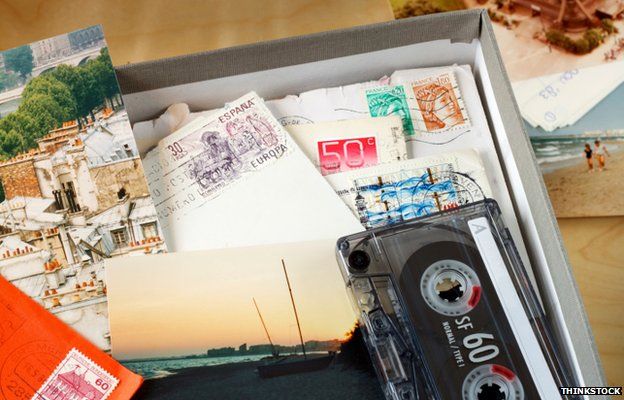Death in the digital age: Are you prepared?
- Published

When 15-year-old Eric Rash committed suicide in 2011, his family and friends wanted to know why.
In a bid to find answers, they went to Eric's Facebook account, and after failing to guess his password, appealed to the social media giant to grant them access.
Facebook refused.
Giving unauthorised access to someone other than the account holder, the company said, was against its privacy policy.
The Rashes, who live in Virginia, tried to fight their case in court, but soon found there just wasn't any legislation that covered the management of "digital assets".
The family's tragic battle is just one of many examples in which the internet has been shown to be woefully unprepared for dealing with death.
In the two years since the Rashes' case, which led to the drafting of a federal law concerning the data of minors, few countries have issued clear guidance on the rights of families to access their deceased loved ones' data.
And despite the fact that we put more of our lives in the cloud than ever before, few of us are preparing for our digital afterlife.
Reaching maturity
"We're accumulating far more digital records in our lives than we are physical ones," says Evan Carroll, who runs The Digital Beyond, a website which explores the subject of digital death.
"But we haven't yet entered the age where we are taking the question of what happens to those records seriously."
Since Mr Carroll and his friend John Romano first raised the issue of the digital afterlife at the South by Southwest (SXSW) festival in 2009, some prominent companies have developed policies for dealing with deceased customers.
Google has a step-by-step process allowing users to plan what they want done with their account, and will sometimes provide the contents of an email account which hasn't left specific instructions, after a "careful review".
Facebook and Yahoo have taken a stricter stance, and won't hand over data without a court order, but the former allows relatives to choose whether they want to close an account or turn it into a memorial page.
However many web companies are lagging behind.
Cloud-based services which store our financial details, emails, music collections, social media interactions, photos and many other potentially precious items have different policies on data ownership, if indeed they have any.
As a result, it is more difficult to bequeath your iTunes library to a loved one than it is to leave your CD collection to them in a shoebox.
Digital wills
So why are we leaving our digital identities hostage to fortune?
Part of the problem is that internet users have tended to be too young to be worrying about their mortality.
But as the average browser gets older (the Office for National Statistics reckons almost 70% of all 65-74-year-olds in the UK are online), the idea of drafting a "digital will" is taking hold.
"We've seen several thousands sign up to our various membership packages," says Paul Golding, who co-launched Cirrus Legacy - a service which allows you to record login details for all your online accounts and leave instructions to a nominated guardian - just a year ago.
"People are beginning to realise what they could lose."
Putting details of your online life in an actual will is not an option, as they are publicly accessible documents, but highlighting where they can be found is a safer bet. Although with passwords and usernames changing all the time, the challenge is to keep the information up to date.
Digital estate planning, as the process of filing your details with a third party has become known, is an increasingly popular business, and many online services offer much more than simply making arrangements for accessing accounts.
Some, such as My Wonderful Life, allow members to write messages to be sent to their dear ones from beyond the grave. Others, such as the ifidie Facebook app, give people the opportunity to share a posthumous joke, or record a confessional video to be released upon their demise.
Cost of inaction
But it is the more conventional services offered by these companies which are proving vital to grieving families.
Most of the time, families don't even know which online accounts their relative had signed up to, let alone the login details.
And the cost of not knowing even a simple email password can be enormous, explains Evan Carroll.
"Email serves many purposes, only one of which is the digital equivalent of our mailboxes," he says. "It is the master key to many other accounts."
But although leaving a list of your online accounts and passwords with a digital estate service might seem like a good solution, it is riddled with risks.
Putting all your online security details in one place puts you at the mercy of a successful hacking attack. And, as Mr Golding admits, if he received "correct information" from a court of law, requiring him to hand over a list of passwords, he would "have to comply".
Furthermore, using the login details left by a dead family member is potentially illegal. The terms and conditions of most established online services state that nobody other than the owner is allowed to use the account.
Your loved ones may also not thank you for some posthumous revelations. Details of extra-marital affairs or a gambling addiction, which would otherwise have been taken to the grave, could be made available to mourners.
But although much of the digital will-making process is still being ironed out, Mr Carroll urges people to do something, even if it is just writing a manual list and putting it in a safe place known only to a spouse.
"Many people say 'I don't have anything that I care about online'," he says.
"But you never know what will one day be of value to your family."
- Published12 April 2013
- Published13 March 2012
- Published14 October 2011